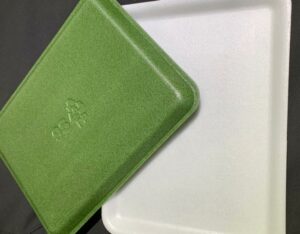
“Expectations for the packaging industry are changing, so we’re working with new substrates to create material alternatives that meet the needs of our customers and their consumers,” said Chuck Gallagher, vice president of business development, Dolco Packaging.
Foam polypropylene (recycling code 5) has many attractive benefits for the food industry. The material is durable, lightweight, heat-resistant, and FDA approved for direct food contact. Foam polypropylene is also a drop-in replacement for common foam polystyrene trays, so there is no need for businesses to take on the extra work or cost required to retool packing equipment.
Like foam polystyrene (recycling code 6), foam polypropylene requires less material to create high-quality products using minimal resources. When compared to solid PET trays, for example, foam polypropylene weighs half as much.
“Because of the material’s efficiency, we believe foam polypropylene will be a valuable competitive solution when compared to other tray alternatives, allowing brands and retailers to meet their business goals,” said Gallagher.
A major wholesale company is the first customer to debut products in the new foam polypropylene meat trays. Because of its similar look to foam polystyrene, foam polypropylene will have a familiar appearance to consumers, so brands and retailers can maintain a recognizable fresh, packed-in-store product look.
“Investing in new technologies and new materials allows us the capability and the flexibility to find solutions to the major packaging issues our customers are facing today,” said Gallagher. “As we diversify our material offerings, our goal is to continue to innovate with value-added solutions that meet the needs of our customers, their consumers, and future generations.”
Tekni-Plex Consumer Products’ move to provide a wide range of materials is part of the company’s Rethink Responsibly initiative, a concerted effort to work toward a more sustainable future. Company-wide actions include reducing overall material usage, increasing recycling efforts, introducing post-consumer recycled materials to existing product lines, and producing more alternative packaging solutions.






